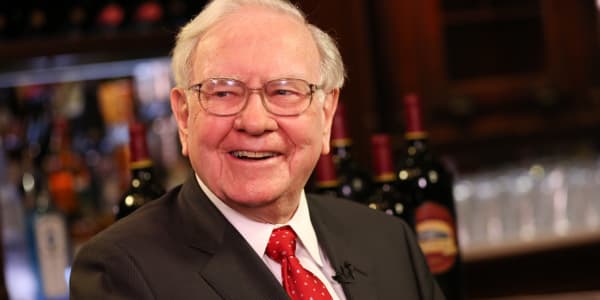For the first time ever, investors are waiting for a public company to achieve a market value of $1 trillion — about the gross domestic product of Indonesia. And the winner could come from among the stocks CNBC's Jim Cramer first dubbed the FANGs — Facebook, Amazon, Netflix and Google, now known by its parent company Alphabet. Some investors now prefer to call this group FAANG, adding Apple.
So which tech giant gets to the magical number first? How soon? And what, if anything, might delay or frustrate FAANG companies from hitting the number? Some thinks it's silly that this race has captured the market's imagination. But the answers to these questions can be constructive for investors because they help identify the strengths and weaknesses in each company's shares which have already contributed outsized gains to most stock portfolios in the past few years.
FAANG: 45 percent of S&P 500 return in May
In May, information technology stocks contributed 76.5 percent of the S&P 500 return, according to S&P Global. Apple alone contributed 21.3 percent of the S&P 500 performance in May. The FAANG stocks as a group: roughly 45 percent of the S&P 500 return in May.
Some conclusions are easy, according to tech analysts: Facebook and Netflix won't get there first, simply because they are smaller and have much more to do to reach $1 trillion. Netflix's $150 billion market cap is not likely to expand sixfold faster than Apple, at $935 billion, can goose its value by 8 percent, CFRA Research analyst Scott Kessler points out. At $540 billion, Facebook has a similar challenge.
So the list of likely candidates boils down to Apple, Alphabet, Amazon and maybe Microsoft, which has had a renaissance since CEO Satya Nadella took over in 2014. Unless they're all beaten to the punch by Saudi oil giant Aramco, whose initial public offering has been delayed but whose profit reportedly topped $33 billion in the first half of 2017, leading to a projected valuation of roughly $2 trillion. That would take a bite out of FAANG hype.
Nonetheless, here's a look at how the race shapes up among the key tech players that have become critical in delivering returns to stock market investors.
Apple
Current market cap: $935 billion (as of market close on June 1, 2018)
Why it will get to $1 trillion first: The market has for years asked one thing of Apple: Show you are more than iPhone Inc. Now it's happening.
The key to recent stock upgrades, like one from Morgan Stanley, whose $214 price target projects Apple will cross $1 trillion in the next year, is Apple's services business, which grew 23 last fiscal year and 31 percent in the second quarter of fiscal 2018, ending in March. Morgan Stanley's Katy Huberty thinks services will reach 27 percent of Apple sales by 2022, up from 15 percent now, and contribute 40 percent of gross profit.
The key stat: Only about a quarter of Apple's device owners are paying users of Apple services like Pay, Music or iCloud, Goldman Sachs analyst Rod Hall said. On top of that, the wearables business (including Apple's Watch and Beats headphones) is now the size of a Fortune 300 company, with $9 billion in sales in the last 12 months.
Diversification matters for two reasons. First, more profit almost always helps stocks rise. But investors also put higher multiples on services companies than on hardware companies, and Apple has long been a cheap stock with a low price-to-earnings multiple by technology-industry standards. The bull argument is based on the idea that investors will pay more for each dollar of Apple profits as more of those come from services, argued CFRA analyst Angelo Zino.
"At this point it starts and ends with the services business," Zino said. "As long as the iPhone business can even be maintained at current levels, the free cash flow it generates can be invested in other businesses."
Valuation: The valuation needed to push Apple over $1 trillion isn't very daunting. Shares are trading at 16 times this year's expected $11.43 in per-share earnings. But not everyone is sold on the transition: Nearly half of the 29 analysts rating Apple shares recommend that clients "hold" or "sell" Apple, rather than buy more.
Why it might not happen. The risk to Apple hitting $1 trillion is something that, in theory, is actually good for the stock: the $100 billion expansion of its stock buyback plan, announced in April. Driven by the new tax law's treatment of offshore earnings, the bill lets Apple buy its shares with retained earnings, wherever they are earned for accounting purposes, rather than borrow money to expand U.S. buybacks. Each remaining share will theoretically be worth more, if earnings stay constant, but with fewer of them, and less cash on its balance sheet, Apple may not get to $1 trillion as quickly.
"It depends on how quickly they do the buyback," Zino said. "At the end of the day, though, we don't think the buyback will keep them from getting to $1 trillion."
Amazon
Current market cap: $796.5 billion (as of market close on June 1, 2018)
Why it will get to $1 trillion first: One word: Cloud.
Cloud computing is the business that has taken Amazon from a narrow-margin, high-growth business whose Wall Street romance was on-again, off-again, to whatever the financial equivalent is of true love. Shares are up 64 percent in the last year, driven by a 48 percent gain in sales at Amazon Web Services, its cloud-computing business.
Far from being the profitless, overvalued wonder that President Donald Trump imagines is dependent on concessions from the U.S. Postal Service, Amazon threw off $18.5 billion in operating cash flow last year. Nearly three-fourths of first-quarter operating profit came from AWS, according to Goldman Sachs analyst Heath Terry.
AWS is likely to grow 45 percent a year through 2020, Terry estimated, and the analyst thinks the unit is worth twice as much as Amazon's North American ecommerce business.
Valuation. If Amazon has an Achilles heel in the race to $1 trillion, this is it. At over $1,600 per share, Amazon trades at more than 120 times this year's expected earnings per share of $12.53. That's one reason hedge fund billionaire Leon Cooperman said recently that all the valuations of the so-called FAANG stocks were reasonable — except for Amazon.
But traditional valuation metrics suit Amazon poorly because CEO Jeff Bezos is known for reinvesting profits in the business, which holds down reported earnings, says CFRA analyst Tuna Amobi. CFRA, which rates Amazon four stars out of a possible five, mostly relies on price-to-sales ratio, which puts Amazon below the median of 10 e-commerce peers, nearly all of which are growing more slowly, he said. But the stock's 124 percent gain in the last two years does affect its prospects, Amobi added.
"For a [five-star rating], we have to have extra conviction," Amobi said, noting that CFRA trimmed its Amazon rating amid its recent stock run-up. "But we're bullish about it, even at these levels.''
Why it might not happen: The No. 1 reason Amazon won't be the first $1 trillion company is that Apple is much closer to the goal already. But it's going to be close, and Amazon is going to get there before too long. The average 12-month price target for Seattle-based Amazon is $2,000, which would get the company's value to about $970 billion. Analyst sentiment on Amazon is very positive: Of 33 analysts whose recommendations are known, only two rate it a "hold" or a "sell."
Alphabet
Current market cap: $782.9 billion (as of market close on June 1, 2018)
Why it will get to $1 trillion first: Consistency, scale and a still only half-penetrated advertising market, argue in Alphabet's favor, said RBC Capital's Mark Mahaney.
The first quarter's 23 percent currency-adjusted revenue gain means the parent of Google has averaged 23 percent year-over-year growth for 33 quarters, or more than eight years, according to RBC Capital. Alphabet's portfolio of new-wave businesses is not a major profit contributor like Apple's services unit or Amazon Web Services, but its autonomous-driving unit Waymo may end up being the most revolutionary of the three.
"If you had to say what the leading company in the world in artificial intelligence is, it would be Alphabet," Kessler said. "I don't know if its ad business is as sexy or exciting as some, but its growth rate has stayed well over 20 percent."
Valuation: At 24 times analyst-consensus 2018 profit estimates, Alphabet is pricier than it has been at many points in the past. Even adjusted for growth, its so-called PEG ratio, which divides the familiar price-to-earnings ratio by projected earnings growth in the teens, stands at 1.84, according to Nasdaq.com, well above Facebook's 1.0.
Why it might not happen: Investors are still waiting to see whether new European regulations on protecting user data will cut into Google's ad revenue. But an April report by Goldman Sachs reckoned that the rules would cut only a few percentage points off growth, and some news reports suggest Google and Facebook are taking advertising market share as the rules took effect in late May, because their size is helping them get consumers to give permission to share data about themselves more easily.




